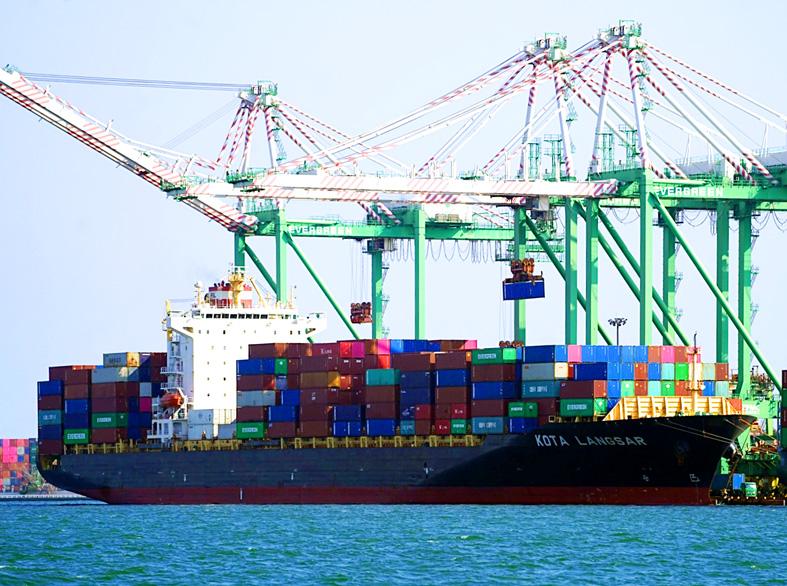Export orders grew for a 16th straight month annually to US$53.75 billion last month, the Ministry of Economic Affairs reported yesterday.
The figure was up 2.8 percent from May and 31.1 percent from a year earlier, it added.
Despite the COVID-19 pandemic, robust global demand for tech products and high commodity prices made last month’s orders the strongest June level on record, Department of Statistics Director Huang Yu-ling (黃于玲) told a news conference in Taipei.

Photo: CNA
For the second quarter, export orders reached US$160.96 billion, up 8 percent from the first quarter and 35.9 percent from a year earlier. That brought orders for the first half of the year to US$309.92 billion, an annual increase of 39.2 percent, the highest for the same period on record, the ministry said.
“The stay-at-home economy has not abated,” Huang said. “The demand for laptops, graphic cards and storage devices remains strong.”
Orders for information and communications technology products grew 6.9 percent year-on-year to US$13.89 billion last month, and those for electronics items increased 36.5 percent to US$16.79 billion, bolstered by demand for 5G and high-performance computing applications, the ministry said.
Orders for optical products expanded 42.7 percent year-on-year to US$2.74 billion last month, driven by demand from China and Hong Kong, it said.
Taiwanese exporters also benefited from the US and EU infrastructure projects, as base metal orders surged 81.8 percent to US$3.32 billion and orders for mechanical products advanced 40 percent to US$2.26 billion, the ministry said.
Orders for plastics and petrochemicals rose 57.5 percent to US$2.6 billion last month, thanks to rising oil prices and increasing demand, while chemical product orders expanded 43.2 percent to US$1.87 billion, it said.
The US was again the biggest source of export orders, which rose 7.8 percent month-on-month and 24 percent year-on-year to US$16.48 billion, it said.
China followed at US$14.43 billion, up 1.5 percent month-on-month and 36.7 percent year-on-year, and the EU came in third with orders of US$9.28 billion, down 2.5 percent month-on-month, but up 24.3 percent year-on-year.
While the pandemic remains an uncertainty, the steady increase in global vaccinations and a pickup in basic infrastructure projects lend confidence to a recovery, Huang said.
“The pace of global economic recovery is picking up, and we are entering into the second half of the year, the strong season for consumer electronic products,” Huang said. “We can expect export orders to stay strong.”
A recent survey of Taiwanese businesses showed that 20.5 percent expect fewer orders for this month, 19.5 percent expect more orders and 60.1 percent expect orders to be flat, the ministry said.
The ministry forecast export orders for this month of US$52.7 billion to US$54.2 billion, down 1.9 percent to 0.9 percent month-on-month, but up 15.7 to 18.9 percent year-on-year.

In Italy’s storied gold-making hubs, jewelers are reworking their designs to trim gold content as they race to blunt the effect of record prices and appeal to shoppers watching their budgets. Gold prices hit a record high on Thursday, surging near US$5,600 an ounce, more than double a year ago as geopolitical concerns and jitters over trade pushed investors toward the safe-haven asset. The rally is putting undue pressure on small artisans as they face mounting demands from customers, including international brands, to produce cheaper items, from signature pieces to wedding rings, according to interviews with four independent jewelers in Italy’s main

Japanese Prime Minister Sanae Takaichi has talked up the benefits of a weaker yen in a campaign speech, adopting a tone at odds with her finance ministry, which has refused to rule out any options to counter excessive foreign exchange volatility. Takaichi later softened her stance, saying she did not have a preference for the yen’s direction. “People say the weak yen is bad right now, but for export industries, it’s a major opportunity,” Takaichi said on Saturday at a rally for Liberal Democratic Party candidate Daishiro Yamagiwa in Kanagawa Prefecture ahead of a snap election on Sunday. “Whether it’s selling food or

CONCERNS: Tech companies investing in AI businesses that purchase their products have raised questions among investors that they are artificially propping up demand Nvidia Corp chief executive officer Jensen Huang (黃仁勳) on Saturday said that the company would be participating in OpenAI’s latest funding round, describing it as potentially “the largest investment we’ve ever made.” “We will invest a great deal of money,” Huang told reporters while visiting Taipei. “I believe in OpenAI. The work that they do is incredible. They’re one of the most consequential companies of our time.” Huang did not say exactly how much Nvidia might contribute, but described the investment as “huge.” “Let Sam announce how much he’s going to raise — it’s for him to decide,” Huang said, referring to OpenAI

Nvidia Corp’s negotiations to invest as much as US$100 billion in OpenAI have broken down, the Wall Street Journal (WSJ) reported, exposing a potential rift between two of the most powerful companies in the artificial intelligence (AI) industry. The discussions stalled after some inside Nvidia expressed concerns about the transaction, the WSJ reported, citing unidentified people familiar with the deliberations. OpenAI makes the popular chatbot ChatGPT, while Nvidia dominates the market for AI processors that help develop such software. The companies announced the agreement in September last year, saying at the time that they had signed a letter of intent for a strategic